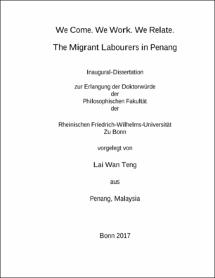We Come. We Work. We Relate. The Migrant Labourers in Penang

We Come. We Work. We Relate. The Migrant Labourers in Penang

| dc.contributor.advisor | Schetter, Conrad | |
| dc.contributor.author | Lai, Wan Teng | |
| dc.date.accessioned | 2020-04-23T14:23:03Z | |
| dc.date.available | 2020-04-23T14:23:03Z | |
| dc.date.issued | 22.11.2017 | |
| dc.identifier.uri | https://hdl.handle.net/20.500.11811/7075 | |
| dc.description.abstract | The PhD-project looks at the everyday work and lives of labour migrants in Penang. They are women and men from Indonesia, Vietnam, Nepal, Myanmar, Bangladesh, and The Philippines. The research employed a mixture of qualitative and quantitative methods. However, the data collection relied mainly on the ethnographic research method, which enriched and enhanced the understanding of¬ workers’ daily activities. This thesis departs from the diagnosis that how migration is studied in Asia and for Malaysia, follows the old scientific divide – either they focus more on structural issues constraining migrants (perspective from ‘above’) or the agency of the migrants themselves (from ‘below’). In consequence, the thesis aims to reconcile the strengths of both scientific camps by taking their respective perspectives on life realities of labour migrants as point of departure for an empirically based synthesis. To capture the experiences and activities of labour migrants in and outside their workplace as detailed as possible, the conceptual framework takes everyday practices as guiding lens. The principal argument deriving from the findings is that, despite the exploitative labour regime, migrant workers seek to translate their aspirations to ‘live a normal life’ and integrate in the receiving society through relational practices that connect them to people, places and certain ideas. My approach to a reconciliation of ‘from-above’ and ‘from-below’ approaches allows me to make sense of how migrants negotiate both aspects of their lives – the exploitative practices in the workplace, and the social activities they pursue in their free time after work. To attempt a synthesis by looking at migrants’ activities is the overarching point of this study. It should not only enable new empirical insights about how labour migration as a process is being experienced from the perspective of the migrants themselves, but also contribute to develop more appropriate analytical tools on a theoretical-scientific level to understand labour migration in its different dimensions and its ramifications better. The concept of relational practices which the thesis employs as analytical lens allows to focus on mundane aspects of the migrants’ life-worlds and to portray them as ordinary denizens with multiple aspirations concerning their life in Penang (and not ‘back home’), plus efforts for self-realisation and achieving satisfaction in everyday life. As a result, the migrant labourers appear neither one-dimensionally to be victims of an exploitative regime, nor permanent activists who seek close network ties with members of their own communal (ethnic) background in order to cope abroad. Moreover, the empirical insights the thesis derived at, allow portraying labour migrants as ordinary inhabitants of Penang, whose everyday life does not substantially differ from that of citizens. In this sense, the thesis also contributes to draw a more realistic picture of the everyday life experiences of migrant workers than scholars have done so far. It was revealed how workers are de facto integrated in local society and self-determined members of urban mainstream society of Penang – sharing similar ambitions and concerns in everyday life. | en |
| dc.language.iso | eng | |
| dc.rights | In Copyright | |
| dc.rights.uri | http://rightsstatements.org/vocab/InC/1.0/ | |
| dc.subject.ddc | 300 Sozialwissenschaften, Soziologie, Anthropologie | |
| dc.title | We Come. We Work. We Relate. The Migrant Labourers in Penang | |
| dc.type | Dissertation oder Habilitation | |
| dc.publisher.name | Universitäts- und Landesbibliothek Bonn | |
| dc.publisher.location | Bonn | |
| dc.rights.accessRights | openAccess | |
| dc.identifier.urn | https://nbn-resolving.org/urn:nbn:de:hbz:5-48950 | |
| ulbbn.pubtype | Erstveröffentlichung | |
| ulbbnediss.affiliation.name | Rheinische Friedrich-Wilhelms-Universität Bonn | |
| ulbbnediss.affiliation.location | Bonn | |
| ulbbnediss.thesis.level | Dissertation | |
| ulbbnediss.dissID | 4895 | |
| ulbbnediss.date.accepted | 10.10.2017 | |
| ulbbnediss.institute | Zentrale wissenschaftliche Einrichtungen : Zentrum für Entwicklungsforschung (ZEF) | |
| ulbbnediss.fakultaet | Philosophische Fakultät | |
| dc.contributor.coReferee | Youkhana, Eva |
Dateien zu dieser Ressource
Das Dokument erscheint in:
-
E-Dissertationen (712)




